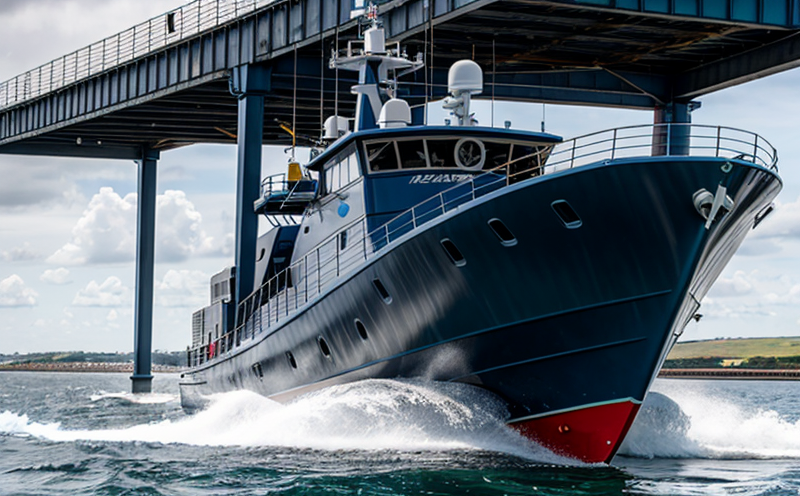ISO 30461 Engine Endurance Testing of Marine Diesel Engines
The ISO 30461 standard is a critical tool in ensuring that marine diesel engines meet the rigorous performance and durability requirements demanded by global maritime standards. This test evaluates the endurance of marine diesel engines under simulated operating conditions, providing assurance that these engines can withstand long periods of continuous operation without failure.
The testing process involves simulating real-world engine operations to mimic the stresses and strains encountered during extended service life. This includes variable load cycles, fuel injection rates, exhaust gas temperatures, and other environmental factors that can affect engine performance over time. The test aims to identify potential weaknesses or areas for improvement in engine design before they become critical issues.
The testing procedure typically involves placing the marine diesel engine on a specialized test bench capable of replicating various operating conditions. Sensors are used to monitor key performance indicators such as fuel consumption, emissions, noise levels, and mechanical wear. The engine runs continuously for extended periods, often days or even weeks, depending on the specific requirements outlined in ISO 30461.
Post-test analysis involves evaluating the data collected during the test to determine how well the engine performed under the simulated conditions. This includes assessing the engine’s ability to maintain performance over time, its fuel efficiency, and its emissions output. The results of this testing are crucial for manufacturers and shipyards as they provide insights into the long-term reliability and sustainability of marine diesel engines.
By adhering to ISO 30461 standards, engineers can ensure that their products meet international quality benchmarks. This not only enhances the reputation of the manufacturer but also ensures compliance with global regulatory requirements. In addition, successful completion of this test can lead to certification by relevant authorities, which is essential for market entry and operational safety.
| Parameter | Description |
|---|---|
| Load Cycles | Variations in engine load to simulate real-world operating conditions. |
| Fuel Injection Rate | The rate at which fuel is injected into the combustion chamber during each cycle. |
| Exhaust Gas Temperature | The temperature of exhaust gases exiting the engine. |
| Mechanical Wear | Measurement of wear on critical components over time. |
| Fuel Consumption | The amount of fuel consumed by the engine during testing. |
| Emissions Output | Measurement of various emissions produced by the engine. |
| Noise Levels | Levels of noise generated by the engine during operation. |
Applied Standards
The ISO 30461 standard is widely recognized and applied in marine engineering for its comprehensive approach to evaluating the endurance of marine diesel engines. This standard ensures that testing aligns with international best practices, providing a robust framework for quality assurance.
In addition to ISO 30461, other relevant standards include EN 50289-2 and ASTM D7569, which focus on specific aspects of engine performance and durability. These standards complement each other, offering a holistic view of marine diesel engine testing.
Adherence to these standards is essential for manufacturers and shipbuilders as it ensures that their products meet stringent quality benchmarks. Compliance with international standards also facilitates easier market entry and enhances the reputation of the manufacturer in competitive markets.
Industry Applications
| Application | Description |
|---|---|
| Marine Vessels | Testing engines used in various types of marine vessels, including cargo ships, passenger ferries, and oil tankers. |
| Oceanographic Research Ships | Evaluating the endurance of engines for long-duration research missions. |
| Offshore Platforms | Assessing engine performance in harsh offshore environments. |
| Liquid Gas Carriers | Testing engines for the transport of liquefied natural gas and other hazardous materials. |
| Military Vessels | Ensuring engine reliability in high-stress military operations. |
| Polar Research Ships | Evaluating engines for use in extreme cold and challenging Arctic conditions. |
| High-Speed Craft | Testing the endurance of engines used in fast-moving vessels. |
| Dredging Operations | Evaluating engine performance during continuous heavy-duty operations. |
Why Choose This Test
The ISO 30461 engine endurance test is a vital component of quality assurance in marine diesel engine manufacturing. It provides manufacturers with valuable insights into the performance and durability of their products, enabling them to make informed decisions about design improvements and optimizations.
This testing process ensures that engines meet strict international standards, enhancing market confidence and regulatory compliance. The test also helps identify potential issues early on in the production cycle, allowing for timely corrections before large-scale manufacturing begins.
For shipbuilders and operators, this test provides assurance of long-term reliability and safety. By ensuring that engines can withstand extended periods of operation without failure, they can operate their vessels more efficiently and safely. This not only improves operational performance but also reduces maintenance costs and downtime.
The ISO 30461 standard is particularly important for companies operating in competitive markets where quality and reliability are key differentiators. Adherence to this standard enhances the reputation of manufacturers, making it easier to gain market share and maintain customer trust.
In summary, the ISO 30461 engine endurance test is a critical tool for ensuring that marine diesel engines meet international standards and provide reliable performance over extended periods. It offers numerous benefits, including improved quality assurance, enhanced reliability, reduced maintenance costs, and increased market competitiveness.





